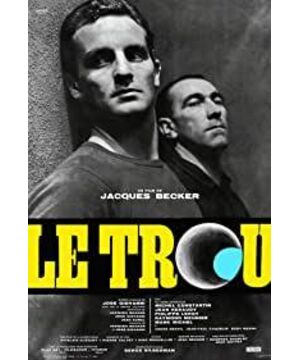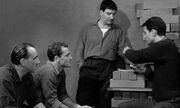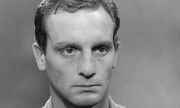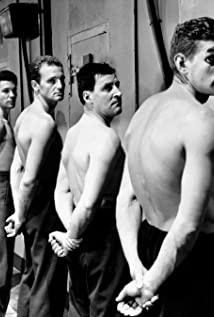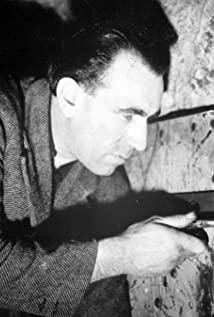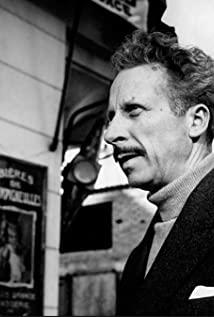First of all, friends who feel disappointed and depressed, as the plot of the movie unfolded until the ending plan failed, Roland's words "poor Gaspard" came to an abrupt end, and you were busy with the protagonists all the way, but experienced an extreme experience. Disappointment and emotional distress put the film's coffin to its conclusion. It’s black or ironic, but it’s not. This movie is a slicker, that is, Roland’s opening remarks in the title, French elegant storytelling, but it’s not just a form....
This opening remark has A carefully arranged scene: In an open field, Roland turned around leisurely after repairing his car, and greeted the audience calmly and indifferently as a free man. . . If you remember, this is the best addition or emotional compensation to the ending. Unfortunately, this slick is too elegant, the joke is too big, and the audience forgot that it was completely related to the future fate of the protagonist. Can't get in touch.
The ending is actually not that cruel. This is not a Nazi concentration camp. The protagonist was stripped of his clothes by the prison guards and stood up against the wall... It should be understood as open-ended. The prisoners are busy this time, and they will face restrictions and punishments in the future. There will only be more, but what does it take to successfully jailbreak? Or more deeply, what do you need to liberate yourself? Superb technology? Although they already have; This time it was almost; but the most important thing is a free and uncompromising heart! With this last point, no matter five or ten years, or twenty years of being trapped like the Shawshank protagonist, freedom belongs to them. Go to prison, but the mechanism and courage of this guy made us smile and say to him: Optimistic about you, buddy~. On the other hand, the whistleblower Gaspard may have escaped his physical imprisonment earlier, but his soul kidnapped by the hypocrisy of society has no freedom or even loses himself forever.
Let's talk about the second point, in my opinion and Shawshank's different positions determine that the two cannot be compared, regardless of which is higher or lower, there is no way to compare them objectively without a system. Don't use the jailbreak to kidnap the nature of the film, I don't think either is easy.
Shawshank is a good film, well-made, and its tone and stand are very in line with the mainstream public's ability to accept and right and wrong, but too clear the distinction between good and evil will inevitably lose the evocative and pondering fun of a literary and artistic work. The protagonist is a flawless victim of a wrongful case, and the prison administrators and executives on the opposite side are irrefutable. The freedom he pursues is simply to take back what belongs to him: justifiable, so the whole film is sensational, fate The twists and turns, the climax and the ups and downs, relying on professional actors, plus skilled camera language, high-end atmosphere and high-grade production make the audience cry, and it is understandable to give thumbs up after watching it, but in a nutshell, it is still a hero who encounters adversity and goes all the way. The old saying of defeating the big boss to realize self-worth, the difference is that in The Lord of the Rings, Aragorn relies on swords, and he relies on IQ.
Compared with Shawshank Kerry's epic of the protagonist's struggle spanning two decades, this "hole" only focuses on a short story that happened in a prison cell in just a few days, which makes you feel that the things discussed in the film are also Focusing on small things is not enough to trigger thinking, then it is biased, and this is the reason why I admire this part more: it uses a concise story and a narrow background to reflect an open mind. See Twelve Angry Men.
I won't comment too much on the realism that has been praised for the performance of the jailbreak process. Part of the uniqueness of "The Hole" is purely individual motivation.
The protagonist's escape here is out of self-interested personal will, that is, the free will of the "ego", not mixed with social attributes and natural attributes. The prison environment it shows is very different from "Xiao": although the same cramped and restricted freedom is restricted, the protagonists are not persecuted, and the spiritual suppression is limited to the scope of control, not to mention the physical abuse and use. The film always shows that this prison is just a machine under the strict legal system, numbness and coldness are stricter than form, and the images of the warden and prison guards are symbolic, accompanied by cunning and hypocrisy, but they are by no means evil enough to be embarrassed to rape and kill people.
And the premise of "Shawshank" protagonist Andy's injustice is that his motive for escape is mixed with the protection of his own rights and the social attributes of fairness and justice. The sinister and cruel environment in the prison gave birth to the natural attributes of his survival instinct. Andy's companion The setting of waiting for the legal process to get out of prison instead of jailbreaking shows that the film is bound by mainstream recognition to a certain extent.
The position of the guys in the "hole" is nothing more than that I don't like being locked up, I don't want to lie down in the grid no matter how comfortable I am, and I have to find an exit to get out of the cage after exhausting my life. It's such a natural and simple reason. In contrast to one of the characters who refused to escape for fear of his mother's sadness, he was accustomed to lying in the house every day and became dependent on the prison environment and lost his strong yearning for freedom. Diversified values, the film does not give any mainstream value inclination in the broad role setting. It is the same character. As the only prisoner left behind, he respects and supports his companions in their pursuit of freedom, and is not afraid of the punishment he faces when he stays. He is also a person whose spiritual freedom is not coerced by the system, and also reflects the shining point of human nature: always lazy He also sweated profusely while assisting his partner to escape from prison, and was even nearly buried by stones. The jailbreakers of "hole" do not have a large-scale background and contradictions, but the characters are vivid, and the sense of proportion is more valuable than the truth, and the mutual understanding of several people who are bound by legal sanctions is limited to this.
Finally, I want to mention the key character of this play, Gaspard. The audience mostly criticizes him from the perspective of a betrayal, but it is worth thinking about that there are also many viewers who have sympathy and understanding for Gaspard, and some people say that Do the same for yourself. This is a very interesting phenomenon, and I am afraid that no one in "Shawshank" feels that way about the villain created. So I say that the "hole" is valuable in the setting of the character and the authenticity of its development. A prisoner who believes that he is about to be released legally, why should he take the risk to escape from prison and add obstacles to his "legal freedom"? Here, regardless of whether he was deliberately arranged by the warden in the plot, he entered the scene as an unwitting bystander. When faced with this dilemma, several strangers accepted him as a part of the plan out of necessity. In just a few days, he was only "informed" and did not take the initiative to participate in any action, but was forced to "enjoy" the fruits of the plan and bear the possible consequences. Everyone can easily accuse Gaspard of being dishonest, but under the circumstances at the time, the law enforcement officers were not oppressors or wicked villains, they were just a group of neutral law enforcement officers who, in order to protect their own interests, abide by the law and expose illegal facts to law enforcement officers , but at the same time need to carry a moral burden. Obedience to those who are in authority, and protect yourself even if it goes against your own principles, this kind of situation really occurs around us (especially the older generation). If it was you, what would you do? Put yourself in the character's shoes, and whether or not Gaspard's criminal nature is what he said, I'm afraid the audience will have to struggle anyway. This is the consciousness of reflection triggered by watching movies, and thinking can be deduced to the height of philosophy and criticism to examine ourselves. As a human being, out of self-worth and judgment of right and wrong, when the social attributes endow us with too many layers of meanings of our own roles contradict each other, tearing apart our complete individual thoughts, how will we choose how to exist?
Seeing this, if someone understands what I'm talking about, please try to understand: that "poor Gaspard", in reality, no matter whether it is in the workplace or in love, does it exist around us or does it exist in ourselves? Under the shell, the "poor" reason is not because we are forced to make choices in the struggle all the time. Isn't the big hand that grabs your neck from your own conscience, reason and emotion, social identity And the pain of self-positioning?
View more about Le Trou reviews


